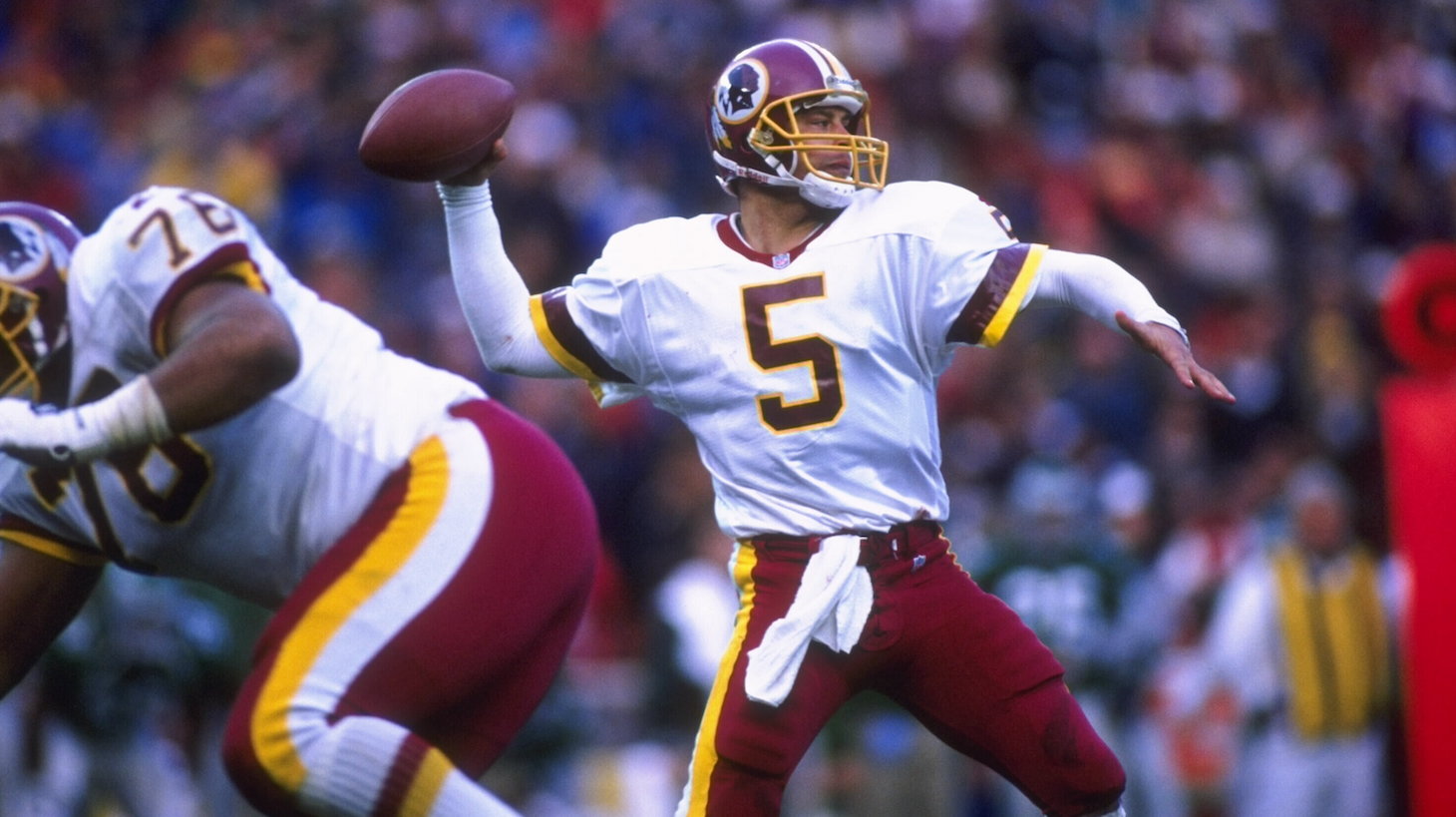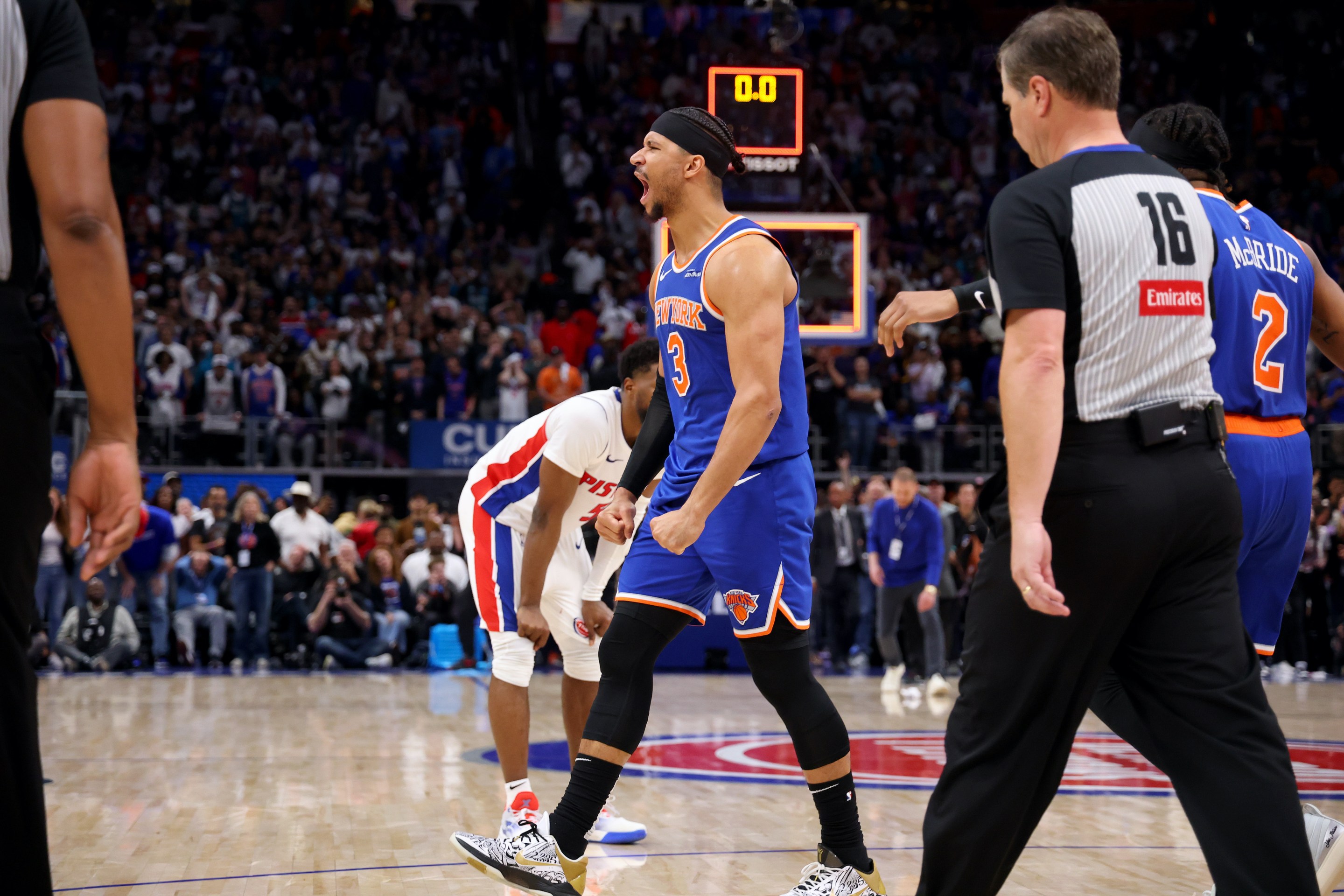Quarterback Navy Shuler is the biggest name of the newcomers to the Tennessee football team. Biggest surname, anyway. Shuler, a sophomore transfer from Appalachian State, is the son of Heath Shuler, a former Volunteer quarterback and one of the most beloved players to ever sport the Power T.
The kid will wear jersey number 21, same as his dad did. If Navy puts up anything close to the numbers Heath did while wearing it (4,089 yards and 36 touchdowns passing, plus another 14 rushing touchdowns, for an overall QB rating of 147) he’ll be more than fine. The 1993 Volunteers offense averaged 441 yards and 39 points per game, statistically the greatest offense in school history. That season Heath was named SEC Player of the Year and got the runner-up spot in the Heisman voting.
“I’m coming HOME,” Navy announced over Twitter after deciding to give his pop’s alma mater a go. And responses on social media and Vols fan message boards seemed exclusively welcoming. Good for the lad and dad.
But Heath Shuler had another football home besides Knoxville, one where everything was less happy and more dysfunctional than things were with his Vols family. He stands as arguably the most despised player in the history of Washington’s NFL franchise.
That sorry standing brings up a giggly, Beltway-centric fun fact about Navy Shuler’s previous football home: At Appalachian State, Shuler was teammates with Gerry Snyder, a 6-foot, 220-pound redshirt freshman tight end. Snyder happens to be the son of Washington Commanders owner Dan Snyder, unquestionably the most despised guy ever associated with the franchise.
Pointing out the sins of the father here is in no way an attempt to cast aspersions onto the son. Gerry Snyder never got any publicity as a recruit, likely because his senior high school season was wiped out by COVID, and he redshirted Appalachian State’s 2021 season. Social media posts he’s made over the years make him seem humble and hardworking, and extremely supportive of teammates. A good locker-room guy no matter his football skills.
But I was plainly beguiled to learn that two guys whose dads would be carved on anybody’s Mount Rushmore of Most Loathed Figures in the history of D.C. sports ended up together on the roster of a school so outta-the-way that only alums have any idea what state the campus is in. (If you haven’t Googled yet like I did: North Carolina.) Or that before COVID, Gerry Snyder played high school football at Bullis School, the same tony prep in Potomac, Maryland, that produced Dwayne Haskins, the only QB overdraft in the WFT's history remotely comparable to Heath Shuler.
And good god, was the elder Shuler’s run lousy. The lede to a Heath Shuler retrospective I found on the website profootballhistory.com summed things up well: “Before Ryan Leaf, JaMarcus Russell, Brady Quinn, and Johnny Manziel, there was Heath Shuler.”
Shuler was picked third overall in the 1994 draft by Washington, a team that had just had its sorriest season in decades but was still buzzing from all the Lombardi Trophy–friendly years under head coach Joe Gibbs. (As things turned out, Hall of Famers Larry Allen, Kevin Mawae, Isaac Bruce, and Bryant Young were picked later that same draft by other teams; Kurt Warner was eligible but not picked by Washington or anybody.)
Shuler was the first big draft pick of new head coach Norv Turner, who came to Washington after a great run as the Cowboys' offensive coordinator and promised to turn the kid into the next Troy Aikman. He didn't.
Shuler got on the fans’ and media’s wrong side by missing the beginning of training camp while holding out for a better contract. “Heath Shuler should get his young fanny into training camp pronto,” wrote generally understated Washington Post columnist Tom Boswell just two days into the holdout.
Shuler ended up getting what was hailed as the biggest deal in team history: $19.1 million over eight years with a reported $5.5 million signing bonus. But nothing else about his stay in Washington ever worked out for him. He threw 13 touchdowns and 19 interceptions during sporadic playing time over three seasons. Gus Frerotte, an unknown and underdog QB from Tulsa who was picked six rounds after Shuler in the 1994 draft, beat him out for the starting job. Frerotte was loved for nothing more complicated than the fact that he wasn’t Heath Shuler.
Before the end of his first year in Washington, the bonus baby from Tennessee was being booed every time he walked on the field during a home game, even if it was as a mid-game replacement for an injured Frerotte. (Disclosure: I was often among the booers, and as ardent as any.) He got in for just one snap in the entire 1996 season, and blew it: Shuler muffed a handoff to receiver Leslie Shepherd on a planned reverse and the play lost 14 yards.
Shuler eventually told management he wanted out, and they obliged by sending him off to New Orleans for some late-round picks. Injuries killed off attempts to restart his career there and again in Oakland. He hung up his cleats for good after the 1997 season.
Shuler had used the signing bonus from his NFL contract to buy up land in Knoxville, and after his playing days went back to his old college town and became a real estate mogul in eastern Tennessee. I called Shuler up in 1999 to ask him to reflect on what happened in Washington, and expected to get bitterness and regret from the Can’t Miss Kid who missed. But instead I encountered a guy who couldn’t have been wiser or humbler about how things turned out in his pro career, or happier with his lot in life—even though he was still using a cane at the time while recovering from his football injuries. For all his efforts, Shuler told me, he just wasn’t up to the job.
“I had no clue when I first got there. No clue at all,” Shuler said with a big laugh. “Then Norv tells me on my first day, ‘Starting today, you’re the leader here! You may be young, but from now on, you’ve got to act like you’re 40 years old!’ But I was 21!”
I was so taken back by Shuler’s serenity that at the end of our conversation, I confessed to having booed him lots, and apologized. He laughed some more and told me not to feel bad, because I wasn’t alone. “I certainly wish I could have played better for them,” he said.
Shuler was able to let bygones be bygones easier than the fans were. While running for Congress in his native North Carolina in 2006, a whole decade after his last fuckup for the home team, a WFT fan started up a website, stopshuler.com, to argue that Shuler should not be allowed to come back to Washington for reasons having nothing to do with any political position. No, it was the damage he’d caused at the quarterback position that took away his right of return.
“We all have painful memories of the Shuler era,” wrote the site’s founder, Jason Woodmansee, as an introduction, “and this is a place to share them.”
History shows that for all of Woodmansee’s tongue-in-cheek efforts to stop him, Shuler did indeed come back to Washington as a U.S. Congressman, representing North Carolina’s 11th District as a Democrat. He served three terms before the North Carolina legislature redistricted the state before the 2012 elections, and, figuring he’d been gerrymandered out of his job, Shuler elected not to run.
While Shuler recovered from any wounds caused by his football run in Washington, there are signs that his stint as a politician left long-term damage: Shuler is now a lobbyist. He was hired by Baker Hostetler, a powerhouse international law firm with offices on Connecticut Avenue NW, to quarterback the firm’s Policy and Regulatory Insights team. He also formed his own lobbying enterprise. And like all the most successful lobbyists in town, Shuler’s outfit, Integrated Strategy Group, shows no obvious principles. In March, for example, ISG filed with the Department of Justice to be an official representative of the government of Qatar. Reports indicate the firm’s close ties to Sen. Joe Manchin are what got him in bed with a nation whose record on human rights is comparable to Shuler’s career QB rating. In the end, Shuler couldn’t be more Washingtonian.






